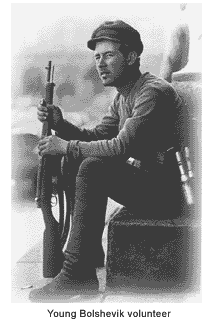In November 1917, the Bolsheviks seized power in Russia and quickly began efforts to withdraw from participation in World War I. The Treaty of Brest-Litovsk was signed in March of the following year. By arranging a separate peace with Germany, Russia created immense problems for its former allies. German soldiers fighting in the East were subsequently transferred to the Western Front and contributed to the initially successful spring offensive in 1918.
 Even before the separate peace had been signed, Allied efforts to intervene in Russia were under way. Reasons for the intervention included:
Even before the separate peace had been signed, Allied efforts to intervene in Russia were under way. Reasons for the intervention included:
 Allied intervention arrived in a variety of forms and at different times. In September 1917, the beleaguered Kerensky provisional government requested U.S. assistance to maintain control of the Trans-Siberian Railway; 280 American transportation experts were given military commissions and were sent to Russia. Japanese forces moved into Vladivostok in December after Kerensky’s fall. French soldiers made a brief appearance in the Ukraine in a confusing struggle among Communists, Whites and Ukrainian nationalists. The British concentrated their efforts in the north in Arkhangelsk (Archangel) and Murmansk, but gave up the venture in the fall of 1919.
Regular American forces under the command of General William S. Graves made an appearance in August 1918 with one segment of the command sent to Arkhangelsk and Murmansk, and the other to Vladivostok. The American leadership had been reluctant to become involved in this venture, but were urged on by the British, who hoped the Bolsheviks' grip could be loosened. The U.S. also was motivated by its growing rivalry with Japan, which had dispatched more than 70,000 soldiers to Russia; the American force would number about 9,000.
Graves was successful with his prime assignment to aid the Czechs, but the relationship with the other Allies was difficult. The British lobbied hard for direct intervention on behalf of the Whites against the Bolsheviks. The Japanese government became increasingly unhappy with Woodrow Wilson, who had initially indicated a willingness to support a Japanese plea for a statement on racial equality in the Covenant of the League of Nations. The British opposed such a statement, fearing that an endorsement of equality might spell trouble for their worldwide empire. In the end, Wilson caved in to British pressure and withdrew his support, which deeply offended the Japanese.
American forces in Russia were not fully withdrawn until April 1920. Japanese soldiers, which sustained heavy losses in Russia, remained until October 1922; some Japanese political and military leaders had lobbied for the outright annexation of Siberia, but were overruled.
The American adventure in Russia did not go unnoticed at home. Newspapers openly questioned the venture, wondering why soldiers should be fighting in a foreign war long after the armistice was signed.
Wilson remained firm in his refusal to extend diplomatic recognition to the new Soviet government, but he pressured Britain and France to give up their interventionist forays into Russia. At the Paris Peace Conference, Russian issues and the status quo in the Pacific were largely ignored.
Allied intervention arrived in a variety of forms and at different times. In September 1917, the beleaguered Kerensky provisional government requested U.S. assistance to maintain control of the Trans-Siberian Railway; 280 American transportation experts were given military commissions and were sent to Russia. Japanese forces moved into Vladivostok in December after Kerensky’s fall. French soldiers made a brief appearance in the Ukraine in a confusing struggle among Communists, Whites and Ukrainian nationalists. The British concentrated their efforts in the north in Arkhangelsk (Archangel) and Murmansk, but gave up the venture in the fall of 1919.
Regular American forces under the command of General William S. Graves made an appearance in August 1918 with one segment of the command sent to Arkhangelsk and Murmansk, and the other to Vladivostok. The American leadership had been reluctant to become involved in this venture, but were urged on by the British, who hoped the Bolsheviks' grip could be loosened. The U.S. also was motivated by its growing rivalry with Japan, which had dispatched more than 70,000 soldiers to Russia; the American force would number about 9,000.
Graves was successful with his prime assignment to aid the Czechs, but the relationship with the other Allies was difficult. The British lobbied hard for direct intervention on behalf of the Whites against the Bolsheviks. The Japanese government became increasingly unhappy with Woodrow Wilson, who had initially indicated a willingness to support a Japanese plea for a statement on racial equality in the Covenant of the League of Nations. The British opposed such a statement, fearing that an endorsement of equality might spell trouble for their worldwide empire. In the end, Wilson caved in to British pressure and withdrew his support, which deeply offended the Japanese.
American forces in Russia were not fully withdrawn until April 1920. Japanese soldiers, which sustained heavy losses in Russia, remained until October 1922; some Japanese political and military leaders had lobbied for the outright annexation of Siberia, but were overruled.
The American adventure in Russia did not go unnoticed at home. Newspapers openly questioned the venture, wondering why soldiers should be fighting in a foreign war long after the armistice was signed.
Wilson remained firm in his refusal to extend diplomatic recognition to the new Soviet government, but he pressured Britain and France to give up their interventionist forays into Russia. At the Paris Peace Conference, Russian issues and the status quo in the Pacific were largely ignored.